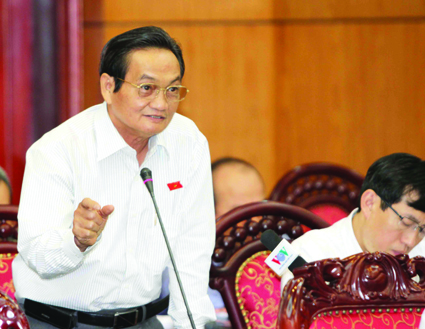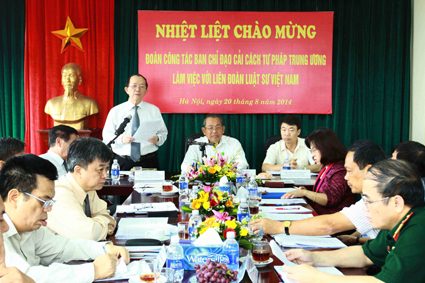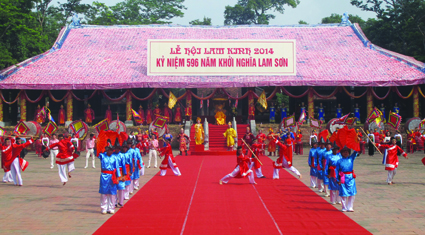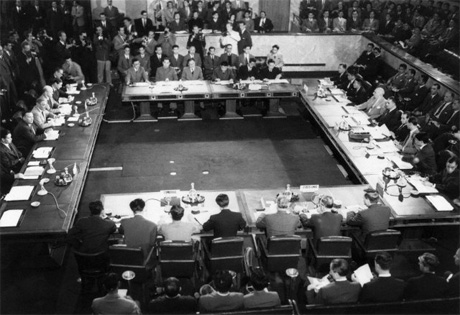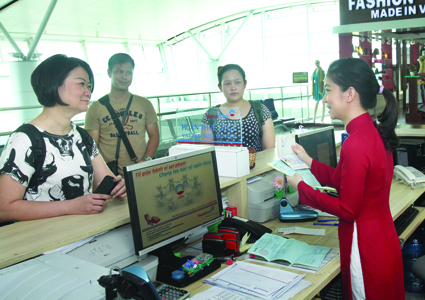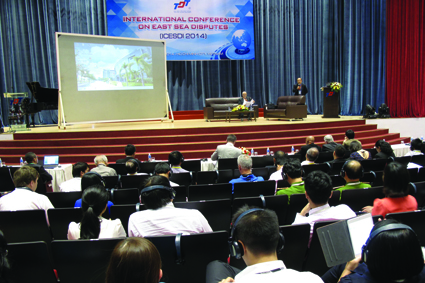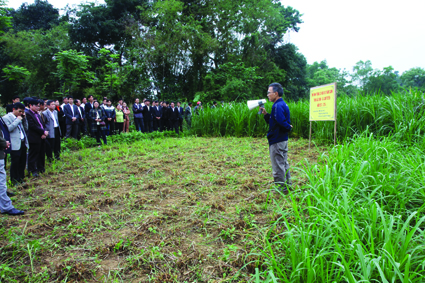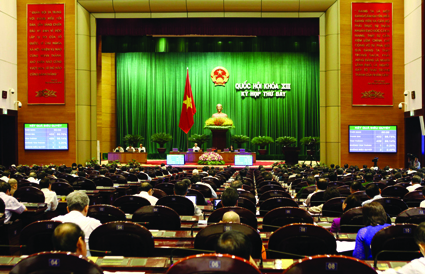The 32nd meeting of the National Assembly (NA) Standing Committee, held on October 6-9 in Hanoi, focused on the agenda of the NA’s 8th session which is scheduled to open on October 20.
During this meeting, the Committee debated the draft revised Law on Promulgation of Legal Documents, the draft Law revising a number of articles of the tax laws, and draft resolution amending Resolution No. 35/2012/QH13 on votes of confidence for holders of positions elected or approved by the National Assembly or People’s Councils. Committee members also discussed preparations for conducting votes of confidence at the upcoming NA’s session.
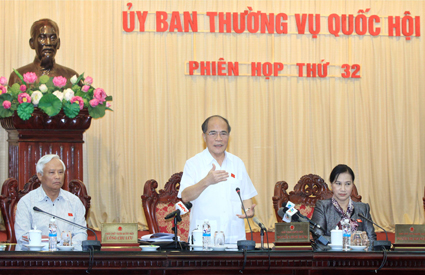 |
| NA Chairman Nguyen Sinh Hung concludes the 32nd meeting of the NA Standing Committee__Photo: An Dang/VNA |
The Committee agreed with the Government’s submission of a project on construction of Long Thanh international airport to the NA for consideration and decision.
Discussing the audit plan for the next year, NA Vice Chairman Uong Chu Luu suggested the plan keep close to the NA’s supervision plan and pay greater attention to socio-economic projects approved by the NA.
Deputies recommended the State Audit Office should play a more active role in auditing foreign businesses that regularly report losses or show signs of engaging in transfer pricing, causing losses to the state budget.
Regarding reports on settlement of complaints and denunciations in 2014, deputies agreed that remarkable results had been made thanks to the close collaboration among ministries and sectors from central to local levels.
According to the Government’s report, the number of citizens visiting governmental agencies to lodge complaints and denunciations had fallen by 1.8 percent compared to the previous year, but the number of class complaints and denunciations increased by 12.1 percent.
Government Inspector-General Huynh Phong Tranh said complaints and denunciations, which were mainly about land management and use, were attributable to shortcomings in current laws and regulations as well as state administration.
He pointed to the lack of human resources to settle complaints and denunciations in many localities and to the limited public awareness of law observance, thus increasing the rate of groundless complaints and denunciations.
NA Law Committee Chairman Phan Trung Ly proposed complaints and denunciations to be settled at local levels to minimize bigger and prolonged cases, saying greater efforts should be made to settle prolonged complaints.
A report of the NA Committee on Science, Technology and Environment pointed out to the improper integration of climate change strategies and policies into socio-economic development plans and the ineffective coordination among localities and regions in implementing climate change policies.
Truong Thi Mai, Chairwoman of the NA Committee on Social Affairs, said the country should carefully calculate funds necessary for response to climate change through 2020 and 2030. She said it remained unclear how the adopted strategies and policies on response to climate change and green growth could be harmoniously implemented.
In its report presented on the last day of the meeting, the Government said that in 2015 it would continue restructuring the country’s economy, focusing on public investment, commercial banks and state-owned enterprises, and would strive for 6.2 percent GDP growth rate.
Members of the Committee underlined major problems to be solved, including low credit growth, delayed and ineffective settlement of debts, and slow restructuring of banks. They also called for more attention to job creation, low-income earners and ethnic minority people.
NA Chairman Nguyen Sinh Hung asked the Government to include more detailed measures to address slow economic restructuring, low productivity, public debts and threats to national security.
Earlier, during its 31st meeting held in Hanoi from September 22 to October 2, the Standing Committee debated nine draft laws to be submitted to the NA for first-time comment and discussed other five draft laws to be submitted to the NA for passage at NA’s 8th session.
Deputy Prime Minister Nguyen Xuan Phuc said the draft amendments to the Civil Code set out to recognize the rights of individuals and organizations in civil affairs, contributing to improving the socialist-oriented market economic institutions and stabilizing the legal framework for the country’s socio-economic development.
The revision of the Civil Code aimed to address problems and limitations in the implementation process so that the Code could create an effective legal mechanism for recognizing, respecting, protecting and guaranteeing civic rights, and minimizing the interference of government agencies in the establishment, change or termination of civic relations, Phuc said.
NA Chairman Hung called for clarification of the draft revised Law on Organization of People’s Courts, saying the draft should reflect the spirit of the Constitution by showing that the court was an independent agency in procedural activities.
A representative of the Supreme People’s Court suggested the draft law give more competence to the court in investigating and collecting evidences in criminal cases.
However, a representative of the NA Judicial Committee said investigating and collecting evidence were the jobs of investigative bodies and in reality, no countries in the world allowed a court to do these jobs.
The NA Judicial Committee agreed with the Supreme People’s Court on the need to establish an administrative court to deal with administrative matters which fall within people’s courts’ jurisdiction.
The draft revised Law on Excise Tax drew divergent opinions of the NA Standing Committee, as concerns were raised on the impacts of the proposed hikes on employment, income, consumption and production.
According to the draft, excise tax on tobacco will be raised from 65 percent to 70 percent from January 1, 2016, and to 75 percent from January 1, 2019. The tax on beer will rise from 50 percent to 55 percent from July 1, 2015, and to 60 percent from January 1, 2017, and 65 percent from the beginning of 2018.
The tax hike roadmap for liquor, beer and tobacco must be reviewed carefully to prevent smuggling and other harmful impacts on domestic producers, said Deputy Minister of Industry and Trade Do Thang Hai, explaining that smuggling would increase if the tax rates were unreasonably high. He cited that tobacco smuggling alone caused an estimated VND 6 trillion (USD 283 million) in loss per year.
Debating the draft law on sea and island resources and environment, the NA leader requested the Ministry of Natural Resources and Environment (MNRE) to clearly define sea resources and the sea environment as well as the responsibility of related ministries to manage these resources.
Nguyen Xuan Thao, head of the Institute of Legislative Studies, said it was irrational that the MNRE would be responsible for managing all sea and island resources. He suggested the ministry manage such resources as oil and minerals while the Ministry of Agriculture and Rural Development should manage the exploitation of aquatic products.
Regarding the draft law on labor safety and hygiene, members of the NA Standing Committee pointed to the need for specific regulations and policies to encourage workers to apply safety and hygiene standards while working in areas prone to labor accidents and occupational diseases.
Many deputies agreed the compensation fund for accidents and occupational diseases would be used to help victims find jobs and to support activities aiming to prevent risks related to accidents and occupational diseases. However, they proposed the draft law should clarify criteria and conditions for workers to receive financial support from the fund to prevent the abuse of the fund.
Debating the draft revised Law on Organization of the Government, Minister of Home Affairs Nguyen Thai Binh said many grounds in the 2001 law were found to be outdated, including the legal status, functions and tasks of the Government and the Prime Minister.
According to the draft, the Prime Minister would be competent to appoint and dismiss heads and deputy heads of all organizations under the Government. He would also have temporary powers pending the appointment of chairpersons of provincial People’s Committees.
The Prime Minister would also have the right to request heads of provincial administration to remove or put on probation chairpersons and deputy chairpersons of People’s Committees at lower levels who violate law fail to perform their tasks assigned by higher-level authorities.
During the question-and-answer sessions, Minister of Natural Resources and Environment Nguyen Minh Quang was questioned about the delay in the grant of land use rights certificates to Hanoi apartment dwellers and the poor management of mineral exploitation throughout the country.
Quang suggested increasing penalties to include criminal prosecution and asked the Government to issue two directives to intensify management of the country’s mineral resources.
For his part, State Bank Governor Nguyen Van Binh said the year’s 12-14 percent credit growth target was within reach, citing that credit had risen by an estimated 7 percent in the first nine months of the year and banks had to add 5-7 percent in the remaining three months to achieve the target.
The year 2014 was the third consecutive year of foreign exchange stability, Binh said, citing “Exchange rates have been always in line with the central bank’s directions. We haven’t intervened in the foreign exchange market in recent months, or we intervened to proactively support exports,” he said.-
